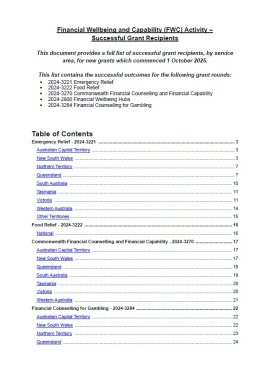Grant round outcomes
The Australian Government has announced new grants for 5 programs under the Financial Wellbeing and Capability (FWC) Activity, with long term agreements being offered for:
- Emergency Relief
- Food Relief (and Material Aid)
- Commonwealth Financial Counselling and Financial Capability
- Financial Counselling for gambling.
Additionally, 2-year grants have been offered for the Financial Wellbeing Hubs program to provide an opportunity to explore further reforms to promote connectivity for clients.
New FWC grants from 2025–26 total around $150 million a year. They will provide supports for clients from pre-crisis, early intervention, to financial response, recovery and resilience.
Organisations had the opportunity to apply for FWC grants, from October to December 2024, through open, competitive or closed, non-competitive grant rounds.
Read the Media Release(Opens in a new tab/window) about the announcement of these grant outcomes from the Minister for Social Services.
Financial Wellbeing and Capability Activity – Successful Grant Recipients
Access thisAbout the Financial Wellbeing and Capability Activity
The Australian Government funds community organisations to support eligible individuals and families in financial crises.
The Financial Wellbeing and Capability Activity:
- provides tools for vulnerable people and those most at risk of financial, social exclusion and disadvantage
- helps people deal with their debt
- empowers people to look after their money and become financially resilient and independent.
Services are free, voluntary and confidential.
Services to help with crises
Financial Wellbeing and Capability Activity services can help individuals experiencing financial distress.
If you’re in a financial crisis you can access emergency relief. It’s free and there are no citizenship or residency requirements.
Find your nearest Emergency Relief service provider(Opens in a new tab/window).
Services to help with managing money
Financial Wellbeing and Capability Activity services can help with managing money:
- financial counselling – help to work through financial problems
- financial education – help to make informed choices
- financial services – help to apply for products such no interest loans or matched savings.
Get support with managing your money now
If you need support with debt management, you can get it now.
Talk with a financial counsellor:
- visit the National Debt Helpline(Opens in a new tab/window)
- call 1800 007 007 (charges may apply)
You can find a financial counselling service at Moneysmart Financial Counselling(Opens in a new tab/window).
Financial counselling and capability services
Loans and savings services
Our work with First Nations peoples
The National Agreement on Closing the Gap is underpinned by the belief that when Aboriginal and Torres Strait Islander people have a genuine say in the design and delivery of policies, programs and services that affect them, better life outcomes are achieved.
We are working to embed the Closing the Gap Priority Reforms into the design and delivery of Financial Wellbeing and Capability programs.
Many organisations funded under the Financial Wellbeing and Capability Activity have Reconciliation Action Plans in place. We encourage organisations funded under the Financial Wellbeing and Capability Activity to provide a copy of their Reconciliation Action Plan (or equivalent) to their Funding Arrangement Manager.
These plans demonstrate organisations' commitment to Indigenous client service delivery and provide evidence to support the closing the gap commitments.
Learn more about how we are closing the gap.
Updates
Find updates about supporting people in financial crisis.
